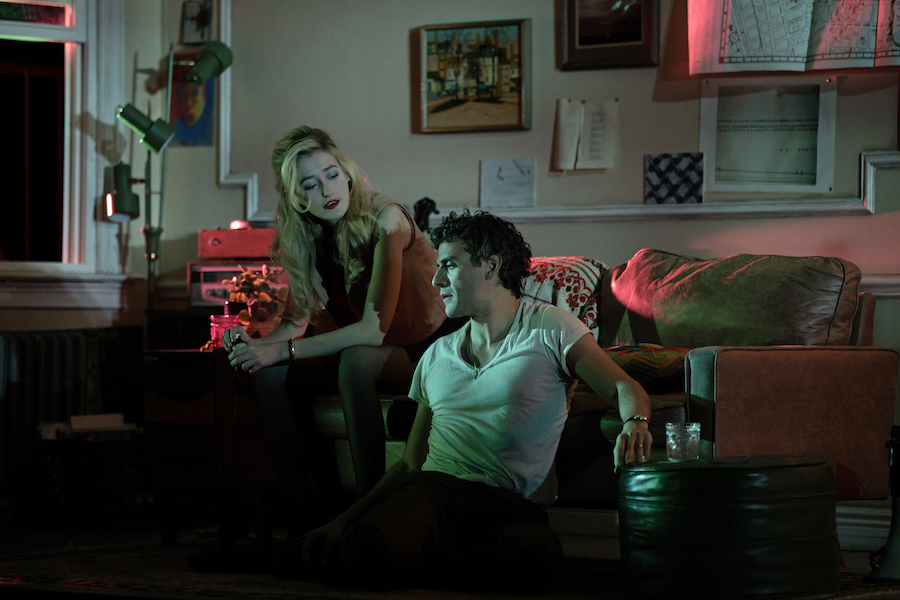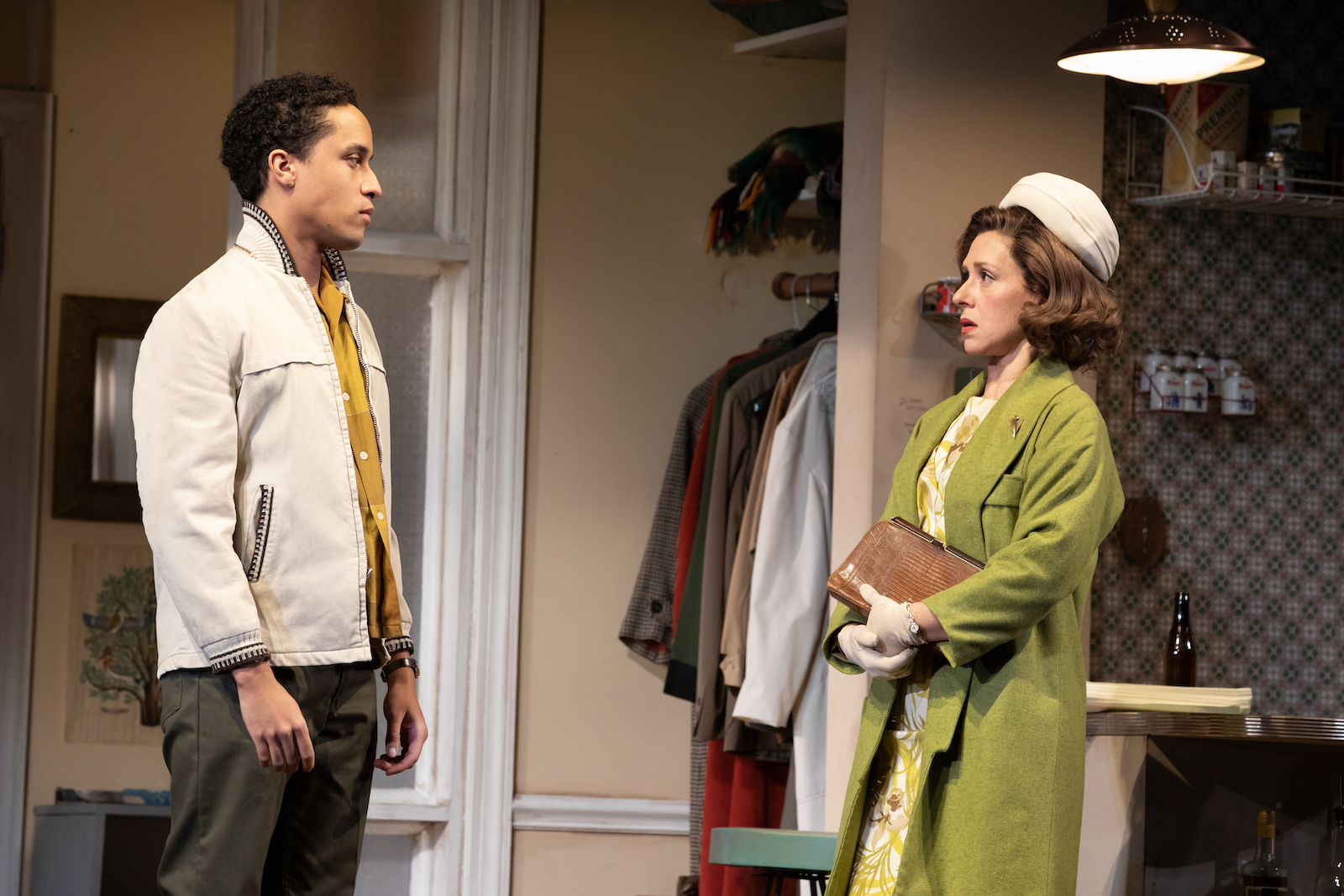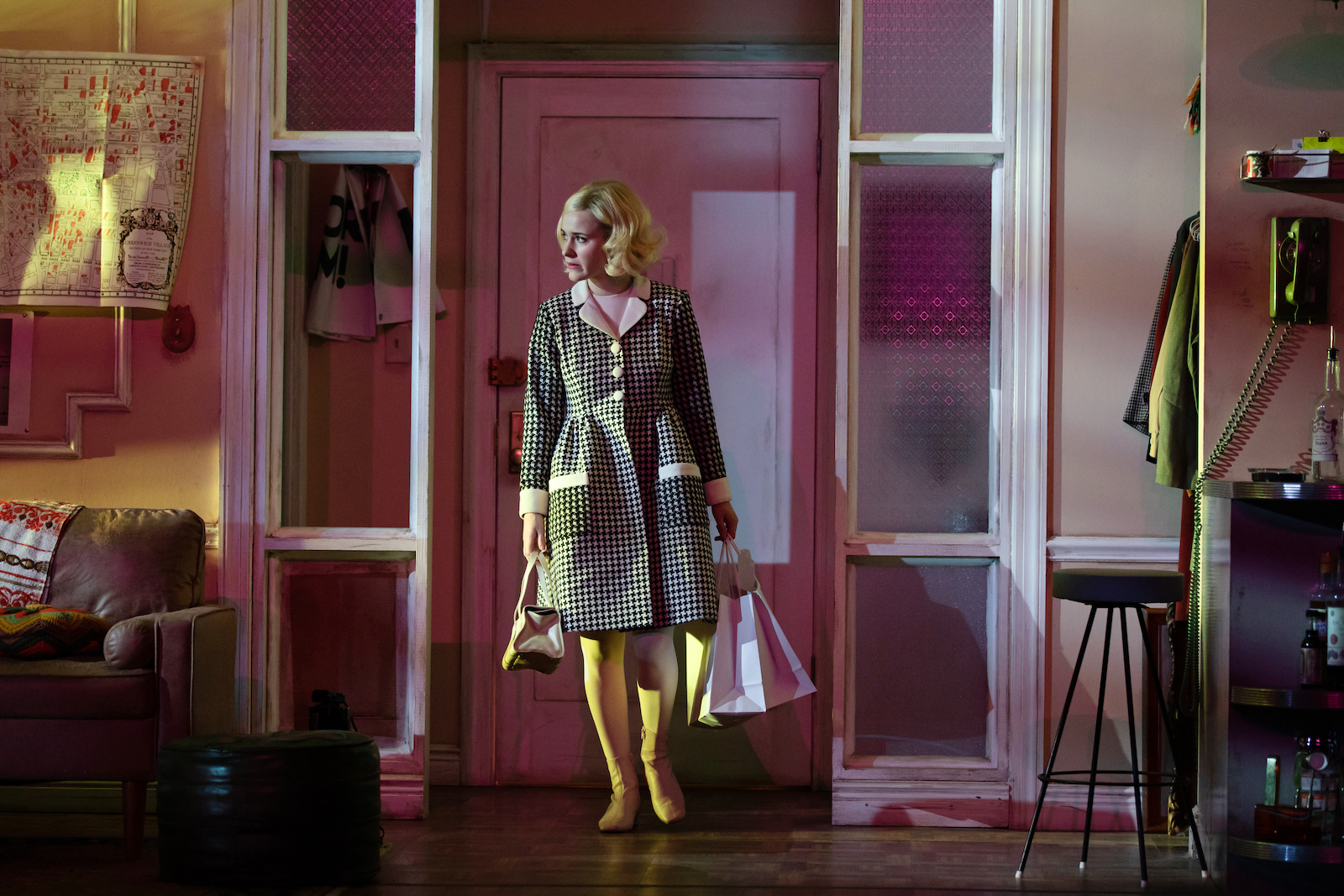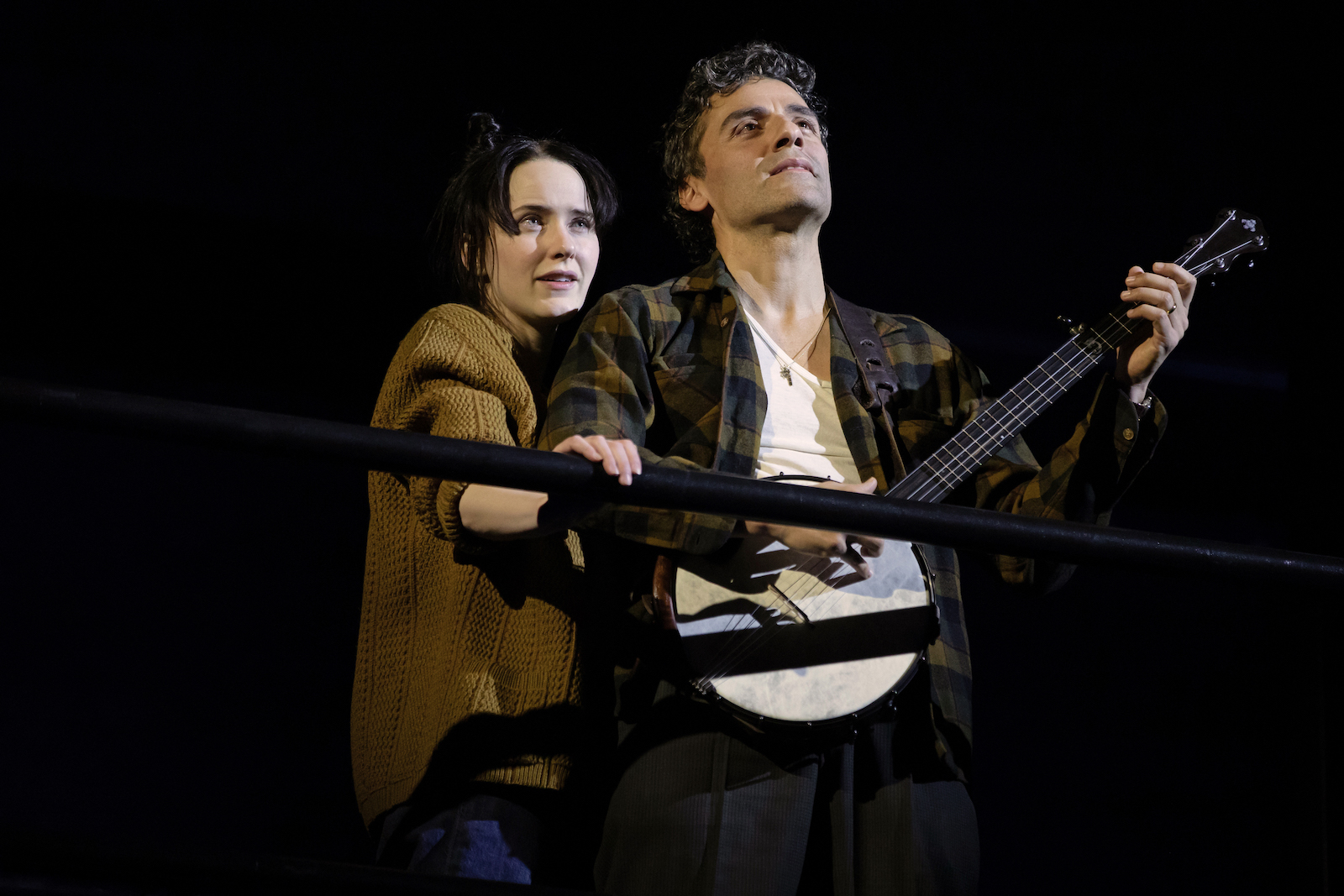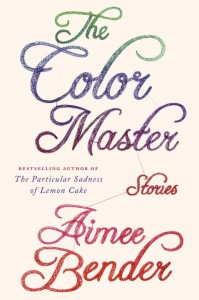The neglected work has a number of advantages over the acknowledged masterpiece. First, it has the element of surprise: we are less likely to know how we are supposed to interpret it. But in its messiness or “wrongness” it can also be more inviting. Because it requires more generosity to appreciate, it gives the viewer or reader the chance to feel a kinship with it, to make it their own. Its flaws often provide insights that a more polished and lauded work cannot.
Lorraine Hansberry’s The Sign in Sidney Brustein’s Window lives in the shadow of its author’s famous first play, A Raisin in the Sun, which along with Death of a Salesman and The Iceman Cometh stands as a signal representation of disquiet in the age of “the American dream.” It was the second and final play that Hansberry lived to see produced on Broadway, running for 101 performances from October 1964 to January 1965, and lasting that long only due to an epic campaign by its supporters despite slow ticket sales and mixed reviews. Hansberry died of cancer two days after its closing night.
A fascinating and hugely entertaining revival of Sidney Brustein had a limited run this winter at the Brooklyn Academy of Music, where I saw it, and recently opened on Broadway with the same cast. Though it now has the benefit of Hansberry’s increasingly and deservedly vaunted reputation—as well as two film and television stars, Oscar Isaac and Rachel Brosnahan, to help keep the lights on this time—the play is still difficult for audiences. Its theme and subject matter are, at least superficially, more diffuse than those of A Raisin in the Sun. In this production the first act lasts for ninety minutes that, though never less than engaging, try one’s stamina. Most significantly, because of the specificity of its time and place—the leftist artistic West Village milieu of the early 1960s, or “this very present,” as Hansberry calls it in the text—it has a greater than usual potential to seem dated or insular. But the times have caught up, or come back around, to Hansberry’s vision, and a play about a multiracial cross section of leftists debating values and strategy while inadvertently revealing their homophobia and sexism now seems quite of the moment.
Isaac plays the title character as a slightly sunnier variation on his struggling folk singer in the Coen brothers’ Inside Llewyn Davis (set in the same time and place), weaponizing his anxious countercultural charm. When the play begins, Sidney has just purchased a weekly neighborhood newspaper following the failure of his dubious-sounding folk music club (not a nightclub, he insists). No sooner has he informed his disapproving wife, Iris (Brosnahan), a struggling actress, than Wally (Andy Grotelueschen), a local political candidate campaigning against “bossism,” arrives seeking the paper’s endorsement for an upcoming election. Sidney, a former radical, is uninterested: “I do admit that I no longer have the energy, the purity or the comprehension to—‘save the world.’”
That he’s protesting too much is immediately clear both to the other characters and to the audience, and if the play were primarily an account of Sidney’s political reawakening it might tip over into being a tired artifact of its time. Instead, Sidney’s capitulation to Wally’s pleas—the titular sign is a campaign poster—makes up only a small part of the play’s action, which follows a number of tangents and characters over nearly three sprawling hours. There’s David (Glenn Fitzgerald), a gay avant-garde playwright who lives upstairs; Iris’s two sisters, Mavis (Miriam Silverman) and Gloria (Gus Birney), one a bourgeois homemaker, the other a professional escort; Alton (Julian De Niro), a Black friend of Sidney’s who plans to marry Gloria without knowing how she makes her living; and Max (Raphael Nash Thompson), a painter with very silly ideas about how to design Sidney’s newspaper.
These characters converge in Sidney and Iris’s apartment, a gorgeously designed, light-filled fantasy of a bohemian space. And they talk, sometimes to advance the plot but more often just to shoot the shit. One of the major pleasures of the play is hearing intelligent conversations unfold in real time and at great length. There’s a funny debate about the “wrong parts” of Thoreau to admire, a running argument about the benefits of psychoanalysis (“I just called you a sadistic, self-satisfying, cruel son of a bitch to your face instead of just thinking it. Don’t you remember when I couldn’t say things like that?”), and cogent riffs on modern art and experimental theater. Almost everyone gets at least one soul-baring monologue, notably Mavis, who in the play’s final third unexpectedly transforms from a one-dimensional suburban busybody into a figure of great pathos. She gets to deliver the play’s best line, which perhaps should be affixed to the Brooklyn Bridge: “Believe me when I tell you, everybody is his own hipster.”
Throughout, Hansberry’s characters maintain an uneasy balance between schematic behavior and the “open destiny of life” advocated by Grace Paley, another Greenwich Villager of the era. Mavis, despite the complex open-mindedness she eventually reveals, is racist and antisemitic; Alton, who at times engages in proto–Black revolutionary rhetoric, is coolly homophobic toward David and viciously judgmental when he finds out Gloria is a sex worker. Sidney imagines Iris as his rustic “mountain girl” and demeans her commercial work. Their lives are a constant roundelay of desire and complaint, attraction to and repulsion from one another.
Even as the characters share a milieu and in most cases a set of ideals, their political affinities hardly ennoble them. An Act One scene in which Sidney and Iris flaunt their acceptance of their racially and sexually diverse friends and defend Gloria’s choices to Mavis provokes an exchange that gets at the heart of the play’s inquiry into what we owe one another.
Iris: Mavis—sooner or later you are going to have to learn that Gloria is living her life and doesn’t want you to play Mama. Live and let live, that’s all.
Mavis: That’s just a shoddy little way of trying to avoid responsibility in the world.
Sidney: Mavis—please go. It makes me nervous to be on your side!
Hansberry suggests that different alliances and choices may be right under different circumstances, that ideology shouldn’t operate independently of a particular moment. Wally, the crusading local politician, is not what he seems, and by supporting him Sidney enables the city’s power brokers to keep consolidating their power; Iris and Sidney will come to regret their decision not to intervene in Gloria’s professional and romantic life. Hansberry’s work is unfashionably democratic in extending empathy to all of its characters, even as she depicts their flaws frankly. As a queer Black woman who was once married to a Jewish man and lived with him for years in the Village, she had insight into her characters’ psychology and doesn’t allow herself the easy out of caricature. Sidney’s constant self-deprecation and mock soliloquizing about his political disillusionment isn’t just a pose, which is made clear in one of David’s responses to him. “Go ahead: kid it,” he says. “It’s easier to kid it than face the pain in it.”
The “right” thing might have been to cut the play down, reduce it to a central conflict or two instead of five or six. The revival does seem to have pruned the original text slightly, and it adds a crowd-pleasing punchline to a climactic scene, but the roughness is very much intact. Anne Kauffman, the director, seems to understand that it’s the sense of teeming life, of imperfect community, that makes the play surprising and original.
The too-muchness places it in the epic tradition of O’Neill and looks forward to the grandeur of Tony Kushner’s Angels in America, but the play and production are comparatively light on their feet, even when tackling capital-T Themes. Isaac and Brosnahan’s comic timing helps, even if it sometimes verges on sitcom snappiness; their practiced ease admittedly reads more as Hollywood than Village hipster. Helen Shaw, writing in The New Yorker, was put off by the glamour of the set and costumes, particularly Brosnahan’s “matching white underwear and tights—everything looking fresh out of the package,” revealed early in the first act in an unmistakable bit of audience bait before the long road to intermission. But the production’s glossy lack of verisimilitude means that the play comes across as a melodrama of ideas rather than a work of realism, which helps reconcile its competing registers. The production has the lightly surreal quality of the Hollywood “issue” films of the 1950s and 1960s, works that, like Sidney Brustein, attempt to simultaneously seduce and edify. The seduction—the pleasure to be found in beautifully clothed (and unclothed) people navigating a thicket of finely wrought language—is just as important as the edification. In this case, a slick package helps a dense problem play not collapse under its own weight.
Each of Hansberry’s plays turns on a moment in which the hero is forced to make a decision of conscience, to either bend to cynicism—often disguised as pragmatism—or continue to stand on principle. These scenes are conventionally dramatic and rousing but also shadowed by ambiguity. In A Raisin in the Sun, Walter refuses an offer from the representative of a racist homeowners group to buy back the house that his family has purchased in a white neighborhood, retaining his dignity but likely sentencing his family to endure a lifetime of financial hardship and bigotry. In Les Blancs, a posthumously produced play that Hansberry never finished, Tshembe, who has returned to a fictional African country from Europe to see his dying father, chooses to stay and join a growing uprising against white colonialists even as he longs to return to his wife and child and live an apolitical life.
Within the sprawl of Sidney Brustein the classic Hansberrian moral dilemma is more a running thread than an all-consuming central motif, and the stakes of the final reckoning—thanks, in large part, to its lead characters’ race and social status—are comparatively low. After he wins the election, Wally is revealed to be a corrupt pawn for the establishment he claimed to be running against, and Sidney is faced with the choice to either expose the truth about him—at the cost of seeing his newspaper destroyed by the political machine—or continue to publish “artsy-crafty” articles and betray his principles. That Sidney will choose the pyrrhic victory isn’t much in doubt. We know he is an idealist beneath his cynical bluster, and Hansberry’s affection for him, flaws and all, is reflected in the other characters’ tolerance and admiration.
But the vehicle for Sidney’s change of heart is the oddest element of the play, and surely the least successful in classical dramatic terms. The night before the showdown with Wally, Gloria arrives unexpectedly at the apartment and indulges in a night of Dionysian excess with Sidney and David, the playwright. Their collective descent into alcohol-induced mayhem is staged like an acid trip in a square studio film, full of declaimed quotations (“It is right and natural for the individual to be primarily concerned with himself”) and flashing lights: this is Sidney’s moral rock bottom. When Sidney passes out, David asks Gloria to come to his apartment to take part in a sexual encounter with a man he’s brought home. She agrees, then at the last minute decides to swallow a bottle of pills instead. When the lights come up on the next morning, we learn that Gloria has died.
It’s a sensationalistic, didactic turn, starkly positing that hedonism and political responsibility can’t coexist. (One wonders what Hansberry would have made of the Sixties cultural upheavals lurking just around the corner.) At the end of a play that’s so alert and alive to the competing realities of its varied characters, so willing to allow room for their unresolved bitterness, it’s startling to arrive at a resolution that seems to insist on a definitive course of action. Sidney is shaken out of his cynicism by this loss, and Iris, who has briefly left him to pursue her acting career, returns to his side.
The abruptness of this pivot shook my expectations of what exactly the play was about, echoing Sidney’s disjunctive psychological experience. The logical connection between Gloria’s suicide and Sidney’s decision to fight city hall is indirect—he failed to care enough for Gloria, more or less, so now he has an obligation to care for his community. Sidney’s oddly elevated final lines heighten the sense of the ending’s hollowness. “Yes… weep now, darling, weep,” he tells Iris. “Let us both weep. That is the first thing: to let ourselves feel again…. Then, tomorrow, we shall make something strong of this sorrow.”
The words are inadequate, ridiculous even, and Isaac doesn’t really try to sell them. The play’s final third feels like a hectic attempt to reconcile its narrative and intellectual tangents in the hope of reaching a mournful but optimistic conclusion. That this effort doesn’t—can’t—quite come together coherently speaks as much to Hansberry’s historical moment as it does to the mechanics of the play’s plot. The West Village politics Hansberry chronicles are imperfect analogies for those of the country at large—one of Wally’s big campaign promises that wins Sidney’s support is putting a stop to the pervasive drug use in the neighborhood—and yet the broader implications make themselves felt. The play premiered at a hinge, after the March on Washington and Kennedy’s assassination, and before the wider embrace of the antiwar movement and the other epochal struggles of the latter half of the decade. The Civil Rights Act had passed a matter of months earlier. It was, in retrospect, something of a high-water mark for multiracial solidarity on the left, even as Alton makes clear in his fiery speeches that this is unlikely to hold.
So what is being mourned and recommitted to in the play’s ending? Throughout her life Hansberry was an active and effective participant in politics, from her youthful involvement in the Communist Party to her work at the Black newspaper Freedom to the meeting she and other prominent Black intellectuals held with Robert Kennedy on civil rights in 1963. Her intimate understanding of the fissures (and limited attention spans) underlying the bohemian ideals of the intellectual class, coupled with the hard-won knowledge gained through her activism, meant that neither a fully restorative nor a fully cathartic ending was possible for this story. It would inevitably be a portrait of promise not yet fulfilled. I hear Sidney’s not quite convincing final lines as the playwright’s way of reckoning with this impasse. Even if we can’t fully believe in them, they give the play a stubborn dignity. It’s not a masterpiece, but it might be something better. It’s alive.
